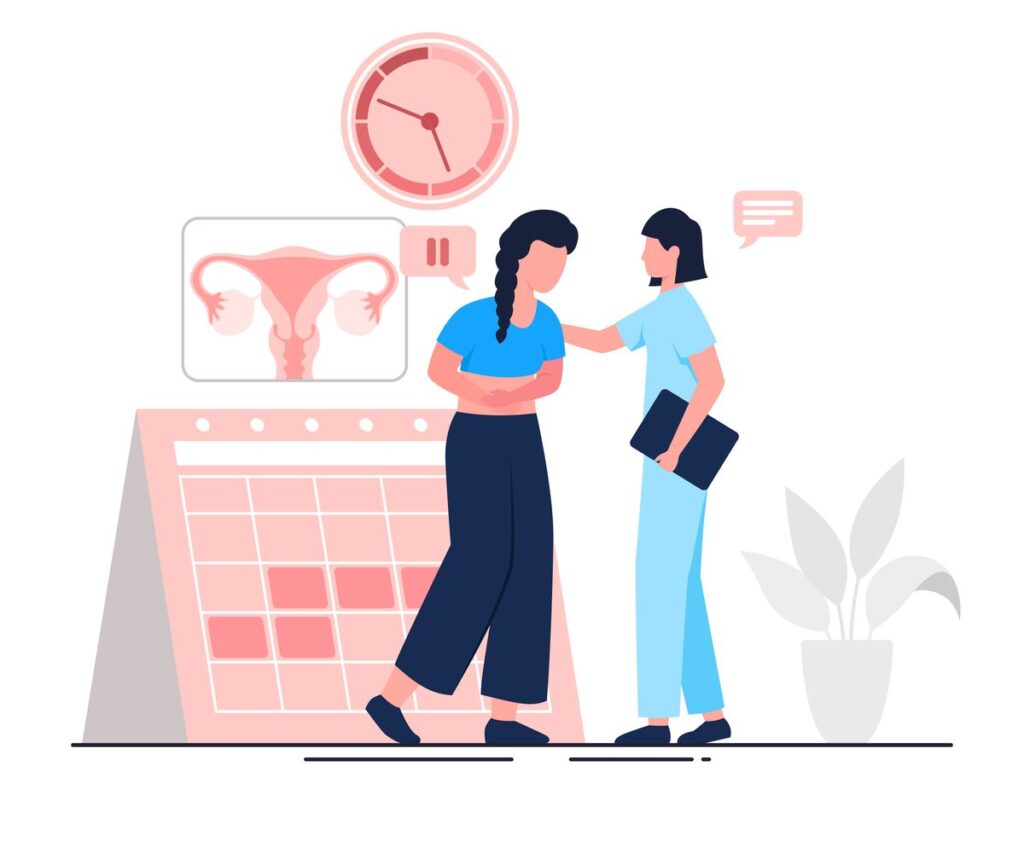PCOD/PCOS- Insights by Dietitian Garima

Polycystic Ovary Syndrome (PCOS) is a common hormonal disorder that affects women of reproductive age. It is characterized by the growth of multiple cysts on the ovaries, which are small fluid-filled sacs that form around the eggs. This results in an imbalance of female hormones, leading to a number of symptoms, including irregular menstrual periods, heavy bleeding, acne, excessive hair growth, and weight gain.
In PCOD (Polycystic Ovarian Disease), the ovaries generate numerous immature eggs, which over time develop into cysts on the ovaries. The excessive buildup of eggs causes the ovary to enlarge and release a lot of male hormone, which leads to infertility.
Understanding PCOD: Unraveling the Condition

In PCOS, the ovaries produce high levels of androgens, male hormones that are present in women in small amounts. This hormonal imbalance can prevent ovulation from occurring and can also affect the menstrual cycle, making it difficult for women with PCOS to get pregnant.
There is no cure for PCOS, but it can be managed with lifestyle changes, such as maintaining a healthy diet and exercise regimen, and medication, including birth control pills and insulin-sensitizing drugs. If left untreated, PCOS can increase the risk of developing other health problems, such as type 2 diabetes, heart disease, and endometrial cancer.
The symptoms of Polycystic Ovary Syndrome (PCOS) can vary from woman to woman, but some of the most common symptoms include:
It’s important to note that not all women with PCOS will experience all of these symptoms, and some women may experience additional symptoms not listed here. If you’re experiencing any symptoms that concern you, it’s best to consult with a healthcare professional for an evaluation.

Irregural periods
Women with PCOS may have infrequent or missed periods, or periods that are longer and heavier than usual.

Weight Gain
Women with PCOS are more likely to gain weight, especially around the waist, which can make symptoms worse.

Infertility
PCOS can make it difficult for women to get pregnant, as ovulation may not occur regularly.

Dark Patches
Dark patches of skin, called acanthosis nigricans, can develop in the folds of the skin, such as the neck, groin, and underarms.

Acne & Oiliness
High levels of androgens can cause an increase in oil production on the skin, leading to acne breakouts.

Mood Changes
Some women with PCOS may experience frequent mood changes, such as depression and anxiety.

Mood Changes
Some women with PCOS may experience frequent mood changes, such as depression and anxiety.

Acne & Oiliness
High levels of androgens can cause an increase in oil production on the skin, leading to acne breakouts.

Dark Patches
Dark patches of skin, called acanthosis nigricans, can develop in the folds of the skin, such as the neck, groin, and underarms.

Infertility
PCOS can make it difficult for women to get pregnant, as ovulation may not occur regularly.

Weight Gain
Women with PCOS are more likely to gain weight, especially around the waist, which can make symptoms worse.

Irregural periods
Women with PCOS may have infrequent or missed periods, or periods that are longer and heavier than usual.
PCOD Cure: Expert Guidance from Dietitian Garima
Embark on a Transformative Journey to Overcoming PCOD with Expert Online Guidance.
As a testament to your resilience, know that PCOD may not have a definitive cure, but with the adept guidance of Dietitian Garima, the Leading Online Dietitian for PCOD, you’re equipped to navigate a path of empowerment and effective management. Dietitian Garima, offers tailored steps for effective management.
Lifestyle changes: Maintaining a healthy diet, engaging in regular physical activity, and achieving and maintaining a healthy weight can help regulate hormone levels, improve insulin sensitivity, and reduce symptoms of PCOS.
Medications: Depending on the specific symptoms and health needs of the woman, medications such as birth control pills, metformin, and spironolactone can be used to regulate menstrual cycles, reduce hirsutism, and improve insulin sensitivity.
Infertility treatment: For women with PCOS who are trying to get pregnant, fertility treatments such as Clomiphene or gonadotropins may be recommended.
Bariatric surgery: In some cases, bariatric surgery may be recommended for women with PCOS who are severely overweight or obese and have been unable to lose weight through other means.
Treating underlying conditions: If a woman with PCOS has coexisting conditions such as diabetes, high blood pressure, or sleep apnea, it's important to treat these conditions in order to manage the overall health and well-being of the woman

Empower your choices and elevate your well-being under the guidance of Dietitian Garima, Your Trusted Online Dietitian for PCOD. These personalized PCOD cure steps, born from her expertise, can be your powerful allies in steering towards hormonal harmony and renewed vitality.
Take the first step towards hormonal balance and renewed vitality by contacting us today.
Conquer PCOD with Kitchen's Diet Solutions
With the guidance of Dietitian Garima, the Leading Online Dietitian for PCOD, discover effective ways to proactively manage your condition through mindful nutrition and lifestyle adjustments.
Eat a low-glycemic index diet: Foods that have a low glycemic index (GI) are slowly digested and absorbed, which helps regulate blood sugar levels and insulin sensitivity. Examples of low-GI foods include whole grains, legumes, vegetables, and fruits.
Limit high-glycemic index foods: Foods with a high GI are quickly digested and absorbed, which can cause rapid spikes in blood sugar levels and insulin resistance. Examples of high-GI foods include sugary drinks, white bread, and candy.
Incorporate high-protein foods: High-protein foods can help regulate blood sugar levels and reduce insulin resistance, which is a common problem in women with PCOS. Examples of high-protein foods include chicken, fish, eggs, and legumes.
Include healthy fats: Including healthy fats, such as those found in nuts, seeds, avocado, and olive oil, in the diet can help regulate hormone levels and reduce inflammation, which can contribute to PCOS symptoms.
Reduce refined carbohydrates: Refined carbohydrates, such as white flour and sugar, can increase insulin resistance and contribute to weight gain. Limiting these types of foods can help regulate blood sugar levels and improve overall health.
Eat plenty of fiber: Fiber helps regulate blood sugar levels and promotes fullness, which can help with weight management. Good sources of fiber include whole grains, fruits, vegetables, and legumes.
Unlock the potential of balanced eating and lifestyle changes with Dietitian Garima, Your Trusted Online Dietitian for PCOD. Start your journey towards hormonal harmony and well-being by incorporating these personalized dietary tips. Contact us to embark on a healthier path.
A Journey of Success and Empowerment
Kitchen's Diet- Best online diet clinic

Expertise
- Trained and competent
- With over a decade in the industry under my belt.
- Received numerous accolades in the fields of healthcare and lifestyle
- Global lifestyle revolution, affecting 5+ countries
- India's go-to nutritionist and lifestyle expert

Diet & Lifestyle
- Tailored Calorie & restriction free diet plans
- No Synthetic Supplements- All Home prepared foods
- No Dieting- Maintain or enhance your present level of health
- Nothing fancy or pricey - Simple Daily meals
- Focused on Nurtition Content- Not Just Calorie Count

Client
- No tricks. No empty assurances or pledges. Prioritize long-term effects
- Get cared like family. Make it a two-way street.
- Help by phone, chat, and email: 9am – 8pm IST (Mon-Sat)
- Diet & Lifestyle Coaching
- Program comes with maintenance plan
Effortless PCOD Healing
3 Simple Steps to Start Your Journey Online
Step 1
Scheduling a Meeting
A successful PCOS-reversal approach can be developed by discussing your health history and current lifestyle with our professional coach.
Step 2
Personalizing Your Strategy
Through individualised coaching, you can form long-lasting behaviours in 4 important areas to reduce PCOS symptoms.
Step 3
Constantly evaluating your development
Meet up with your personal trainer online to discuss your progress and any issues you may be having.
Getting started on the road to PCOS recovery.
Your PCOD Queries, Answered by Dietitian Garima
Polycystic Ovary Syndrome (PCOS) is a hormonal disorder common among women of reproductive age. It’s characterized by the growth of small cysts on the ovaries, which can cause a range of symptoms, including irregular periods, infertility, weight gain, and excessive hair growth.
The exact cause of PCOS is unknown, but it’s believed to be related to a combination of hormonal imbalances, insulin resistance, and inflammation.
Women who are of reproductive age and have a family history of PCOS, are overweight or obese, or have a history of insulin resistance are at higher risk for developing PCOS.
Common symptoms of PCOS include irregular periods, excessive hair growth, weight gain, and infertility. Other symptoms may include acne, dark skin patches, and mood changes.
PCOS is typically diagnosed through a combination of a medical history, physical examination, and blood tests to check hormone levels. An ultrasound may also be performed to visualize the ovaries.
Yes, PCOS can make it difficult for women to get pregnant because ovulation may not occur regularly. Infertility is a common symptom of PCOS.
Treatment for PCOS may include lifestyle changes, such as maintaining a healthy diet and engaging in regular physical activity, as well as medical treatments, such as birth control pills, metformin, and spironolactone. In some cases, bariatric surgery may be recommended.
Yes, a healthy diet can play a significant role in managing the symptoms of PCOS. A low-glycemic index diet, high in protein and healthy fats and low in refined carbohydrates, may be particularly helpful.
Yes, women with PCOS have an increased risk of developing other health problems, such as type 2 diabetes, high blood pressure, and heart disease. It’s important to closely monitor overall health and treat any coexisting conditions to manage the long-term health of women with PCOS.
No, PCOS is a chronic condition that requires ongoing management. However, with appropriate treatment and lifestyle changes, the symptoms of PCOS can be improved and managed over time.
You’ll get weekly health tips, blog updates and my best wellness advice, because when you like us stick together, anything is possible.
We swear, we never spam on your mail. Just share and grab the exciting offers.
Download your free Ebook now!
